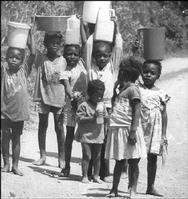
Home » News
»
Local
government and community development

Children
carrying water in the Blue Mountain community of Epping Farm,
St. Thomas. -File photo
Andrew
Smith, Staff Reporter
THE
UPCOMING Local Government elections to be held on June 19
will be the first one since September 10, 1998. The Jamaican
electorate will choose 227 local government representatives
in the 12 Parish Councils and the Kingston & St. Andrew
Corporation (KSAC). In recent years the voter turnout for
these elections has been low, and if you asked the average
Jamaican to name their councillor, they would be unable to.
The exception to this apathy might be in the rural areas,
because an irate populace needs to know who to blame for having
inadequate roads, a poor water supply and a breakdown in basic
infrastructure.
DECENTRALISATION
FROM KINGSTON
This
lack of infrastructure, especially in rural area has resulted
in many Jamaicans being disenchanted with local government.
This should not be the case. Councillors in local government
should be the catalyst by which community development occurs
from the ground up. This is opposed to traditional "trickle
down" development from centralised government.
Kingston-based
centralised government is considered by many rural citizens
as the bane of their existence. From the neighbouring parish
of St. Thomas, I have heard innumerable farmers state that
their parish is not a part of Jamaica. They base this assertion
on not receiving any Government support in the producing or
marketing of their goods.
By
empowering the local government structure and providing them
with the necessary resources to help the local communities
help themselves, then the odds are strengthened that long-term
community development will occur.
COMMUNITY
DEVELOPMENT
Community
development is based on the physical quality of life of the
residents. If children cannot receive education, if farmers
cannot take their crops to market and if mothers cannot provide
clean water for their family's domestic needs, communities
will not develop. Residents will migrate from their community
to larger urban centres which places pressure on their infrastructure.
This is evident by the slums which are in close proximity
to the all-inclusive hotels in Montego Bay and Negril.
In
many locations, the foundation for improved community development
already exists. In Clarendon's south coast near the world-famous
Milk River Bath is the fishing community of Farquhar Beach.
Up to 2001, this community of 200 persons relied on a 1,000-gallon
tank for its water needs. According to residents, it was filled
by the Parish Council "when dem feel like", which
ends up being once a month. The water in the tank lasts for
two days. When no water is available, residents are forced
to go to Milk River for water. If the facilities at Milk River
were developed properly with the involvement of the neighbouring
communities then the economic and infrastructural benefits
would spread to these residents.
TRANSPARENCY
& VISIBILITY
Local
government and community leaders need to be seen and heard
by the residents. Professor Rex Nettleford, speaking at an
Organisation of American Sstates (OAS) sub-regional meeting
on the "Pro-gramme of Co-operation in Decentralisation,
Local Govern-ment & Citizen Participation" in June
1998 remembered growing up "with vestries and municipalities
or parochial boards (later renamed Parish Councils) and having
a real chance for ready dialogue with local representatives
whom we actually saw, and who lived among us."
Now
this is no longer the case. In many rural communities, the
councillor is an unknown entity. As Professor Nettleford said,
this is a result of "a perverse and deliberate programme
of emasculation of the local government system." He emphasises,
"investment in local government is an investment in human
capability for self-governance over the long haul in building
a nation and shaping a society."
Professor
Nettleford said that, the citizens' easy and inexpensive access
to primary healthcare, running water, education, decent housing,
good roads all hallmarks of social justice, equity and the
building of self-esteem remain on the agenda of humankind's
concern.
The
hijacking of all these basic community responsibilities by
a central Government into a national monopoly by this or that
party has served to deprive local communities of a sense of
purpose all over the region, and has resulted in a certain
cynicism duly exploited by talk shows in Jamaica, and for
which we are now paying dearly.
These
comments were made five years ago, preceding the last Local
Government elections. Unfortunately there has been no marked
improvement in the lot of ordinary Jamaicans. Maybe between
June 19, 2003 and the next Local Government elections, some
progress will be made. Based on the past record, this will
not occur.

|







